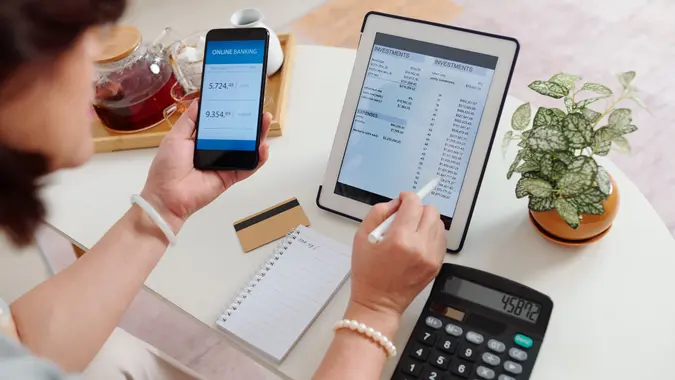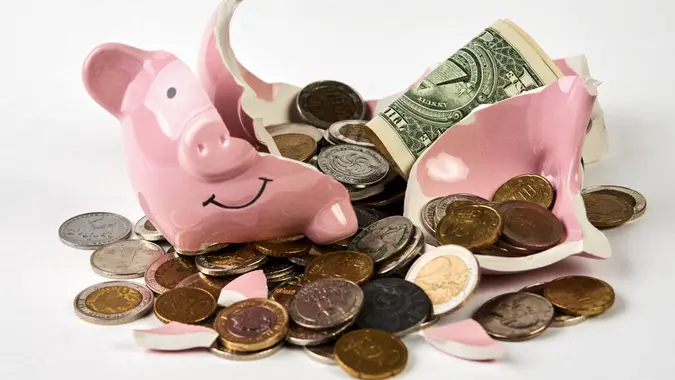Advertiser Disclosure
GOBankingRates works with many financial advertisers to showcase their products and services to our audiences. These brands compensate us to advertise their products in ads across our site. This compensation may impact how and where products appear on this site. We are not a comparison-tool and these offers do not represent all available deposit, investment, loan or credit products.
Inflation Is on the Way for 2021 – Here’s What That Means for You
 Written by
Ann Logue
Written by
Ann Logue

Commitment to Our Readers
GOBankingRates' editorial team is committed to bringing you unbiased reviews and information. We use data-driven methodologies to evaluate financial products and services - our reviews and ratings are not influenced by advertisers. You can read more about our editorial guidelines and our products and services review methodology.

20 YearsHelping You Live Richer

Reviewed by Experts

Trusted by Millions of Readers
The United States hasn’t seen significant inflation in almost 40 years. That may change soon, thanks to a massive federal deficit, pent-up demand when quarantine restrictions are released and a shift in Federal Reserve monetary policy. Last last week, Bill Dudley, the former president of the Federal Reserve Bank of New York, made waves with his column, “Five Reasons to Worry About Faster U.S. Inflation,” for Bloomberg. On Monday, however, two of the publication’s economic reporters called 2021 inflation a “mirage.”
What exactly is inflation, anyway? And do you really need to worry about it or not? Read on for more about how this not-so-complicated economic phenomenon will directly affect you in 2021.
Last updated: Dec. 30, 2020
Inflation Is an Increase in Price Levels
Inflation is the opposite of deflation, which is a decrease in price levels. Since the 2008 financial crisis, the US economy has experienced very low inflation and even deflation. Outside of a few sectors, such as health care, Americans have not had to deal with many unusual price increases.
In 2021, however, as Reade Pickert and Vince Golle explain at Bloomberg, “Americans are likely to see prices jump across a variety of sectors next year, thanks in part to Covid-19 vaccines that will potentially turbocharge demand for such pandemic casualties as travel and tickets to sporting events.”
Inflation and Hyperinflation Are Not the Same Things
A moderate level of inflation occurs naturally in a growing economy.
Hyperinflation, which is usually defined as inflation above 50%, is destructive to an economy. In recent years, hyperinflation has destroyed the economies of Zimbabwe, Venezuela and Argentina. The nature of the inflation being discussed for the US in 2021 is 2% to 4%, nowhere near the 438% rate predicted for Venezuela for 2021. Some people hear the word “inflation” and panic, but there is no need for that.
And, according to Pickert and Golle, “One critical ingredient will be missing to sustain higher inflation: a tight labor market.” Wages are likely to stay low, which will keep “pressure” prices, too.
Inflation Can Stimulate Parts of the Economy
As with most things (especially when it comes to finance), inflation is good for some people and not for others. Moderate inflation has plenty of economic benefits: Higher prices encourage businesses to invest and expand. Interest rates go up, so banks start paying interest on checking accounts again. And higher wages, which will indeed come to certain sectors of the labor market, give workers an incentive to spend money.
Management Challenges Will Be a Little Different Next Year
Early on in a period of inflation, corporate profits will increase because inventory costs may reflect pre-inflation prices – but wages will not increase right away.
Over time, wages and costs will both increase, and depreciation will be based on historic costs that do not reflect actual replacement values. Managers will need to think about costs differently, and some will do better than others.
Debtors Benefit at the Expense of Savers
If wages increase by 4% a year, then a mortgage with a 2.5% interest rate gets cheaper each year by comparison (essentially, if you owe somebody money, in a period of inflation you’re paying back your lender with cash worth less than it was at the time you originally borrowed it). However, a bank CD paying 2% interest would also lose spending power every year during inflation periods. Bond prices also fall.
So if you’re more of a saver than a borrower, you must search for returns that will keep up with inflation.
Bottom Line? Don’t Wait for the Sale
In recent years, consumers have been trained to “wait for the sale” – to avoid buying a good because it’ll surely be cheaper later. In a deflationary environment, goods do in fact go down in price over time. But under inflation, prices go up, so it doesn’t make sense to wait.
(In a hyperinflationary economy, people essentially find that shopping is a better use of their time than going to work. If prices are increasing daily or even hourly, wages can’t keep up.) In 2021, act quickly based on real-time circumstances rather than what you expect to happen in the future – and think about whether you’re more of a debtor or a saver.
More From GOBankingRates
-
19 Effective Ways To Tackle Your Budget
-
30 Important Money Habits for Your Financial Future
Share this article:




You May Also Like



8 Ways To Use Your Bank's Products & Services To Build and Protect Wealth
January 26, 2026
4 min Read

I'm a Bank Advisor: Avoid These 7 Common Account Mistakes and Do This Instead
January 15, 2026
4 min Read



I'm a JPMorgan Chase Advisor: 4 Costly Banking Mistakes Putting Your Money at Risk
January 09, 2026
4 min Read

I'm a Bank Teller: 9 Reasons You Should Never Ask for $2 Bills From the Bank
January 08, 2026
4 min Read


3 Big Reasons Americans' Bank Accounts Are Shrinking -- and How To Fix It
December 11, 2025
4 min Read



Make your money work for you
Get the latest news on investing, money, and more with our free newsletter.
By subscribing, you agree to our Terms of Use and Privacy Policy. Unsubscribe at any time.


Thanks!
You're now subscribed to our newsletter.
Check your inbox for more details.



Sending you timely financial stories that you can bank on.
Sign up for our daily newsletter for the latest financial news and trending topics.
For our full Privacy Policy, click here.
Looks like you're using an adblocker
Please disable your adblocker to enjoy the optimal web experience and access the quality content you appreciate from GOBankingRates.
- AdBlock / uBlock / Brave
- Click the ad blocker extension icon to the right of the address bar
- Disable on this site
- Refresh the page
- Firefox / Edge / DuckDuckGo
- Click on the icon to the left of the address bar
- Disable Tracking Protection
- Refresh the page
- Ghostery
- Click the blue ghost icon to the right of the address bar
- Disable Ad-Blocking, Anti-Tracking, and Never-Consent
- Refresh the page





